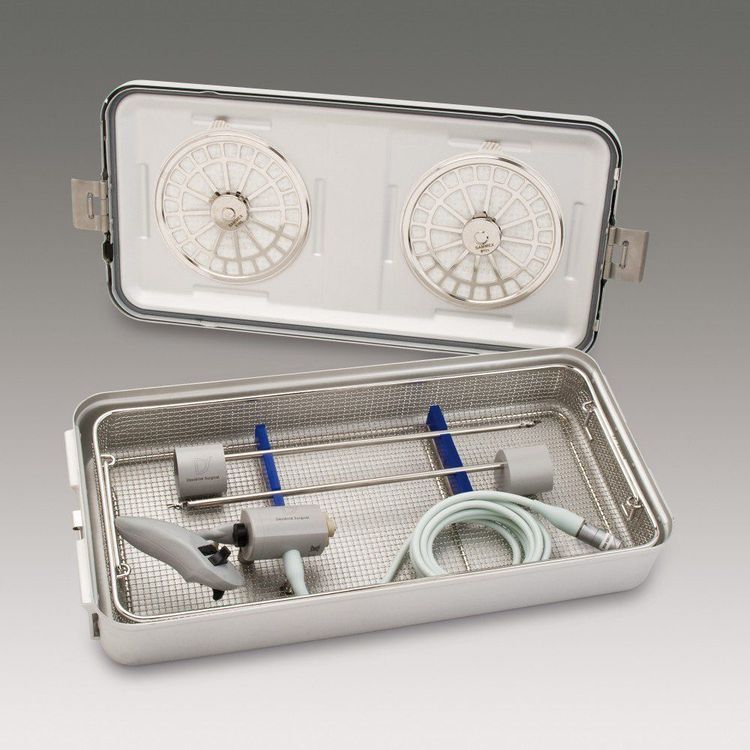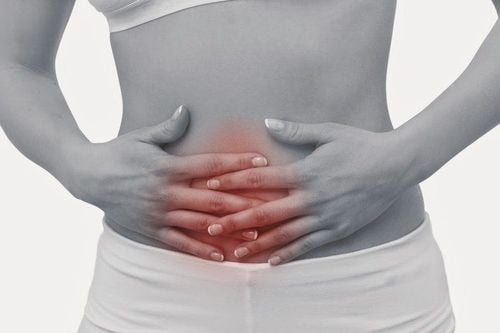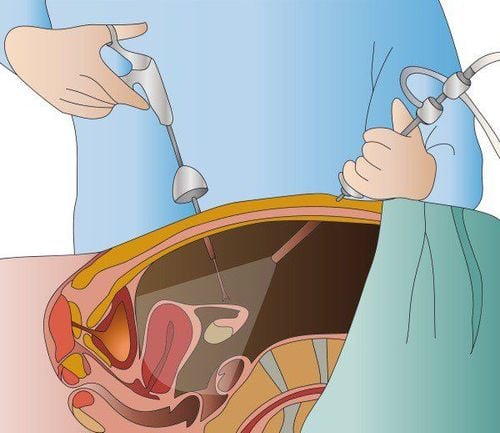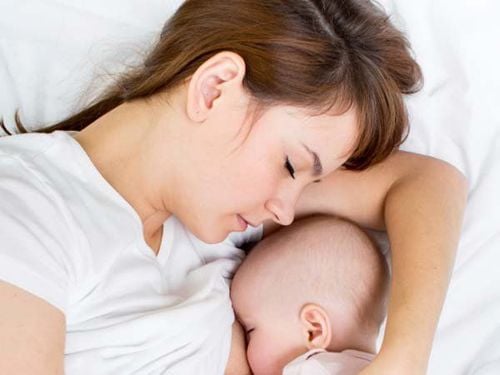This is an automatically translated article.
The article was professionally consulted by Doctor Nguyen Chi Quang - Obstetrician and Gynecologist - Department of Obstetrics and Gynecology - Vinmec Central Park International General Hospital.Uterine fibroids, depending on the location and size of the tumor, the disease presents with different symptoms. For each type of tumor and depending on the patient's health situation, the doctor will prescribe different treatment methods.
1. General information about uterine fibroids
Uterine fibroids are usually benign tumors. The tumor usually occurs on or in the muscular wall of the uterus. The cause of fibroids is often explained by an increase in the level of the hormone estrogen in the female body. Fibroids are then formed from a smooth muscle cell that divides many times and grows into a firm, elastic mass that separates from the rest of the uterine wall.Uterine fibroids can grow as one mass or multiple masses with sizes ranging from 1mm to 20mm. For small tumors that usually will not cause any symptoms that affect the patient's health, the patient can "live" with it peacefully. But for large tumors, it can cause blood loss, make the patient bleed more during menstruation, put pressure on the bladder and make the patient's abdomen enlarge like pregnancy. At this point, the patient should see a doctor to choose the appropriate treatment.
2. Common symptoms of uterine fibroids

Rong kinh hay cường kinh là một trong những triệu chứng phổ biến của u xơ tử cung
Abnormal vaginal bleeding during menstruation: Menorrhagia (long menstrual periods) and hypermenorrhoea (heavy bleeding) Frequent pain or a feeling of pressure in the area Pelvic pain during sex Urinating a lot and often due to the pressure of uterine fibroids on the bladder Frequent constipation or feeling of bloating When lying down, the lump can be palpated in the lower abdomen Large belly like gills Pregnancy Lower back pain. For those cases that are not detected and treated in time, the patient may experience complications that affect health and quality of life caused by uterine fibroids, especially during pregnancy. :
Early placental abruption leads to lack of blood supply to the fetus. Large tumor will affect the fetus, compressing the fetus, making it easy to miscarry. Hemorrhage at birth; Torsion, tumor rupture, acute bleeding Loss of ability to give birth (infertility)...
3. Factors affecting the choice of treatment for uterine fibroids
The doctor will choose the treatment method for uterine fibroids based on the following factors:Size of uterine fibroids: large or small If the tumor is small, it has not caused symptoms such as menorrhagia, bleeding, then follow up with the doctor. routine or medical treatment. If the tumor is large and accompanied by symptoms that affect the patient's health and life, surgery should be performed. Depending on the patient's condition, the decision to preserve or remove the uterus is decided.
Where the uterine fibroids are located: Subserosal fibroids: grow from the uterus and outward Submucosal fibroids: this is a tumor that grows in the endometrium and can affect your menstrual cycle, which in turn can lead to infertility and miscarriage Stem fibroids: this type of tumor Separated from the uterus but still attached by a small stalk.

Lựa chọn cách điều trị còn phụ thuộc vào vị trí của u xơ tử cung
Menopausal status: At the age of menopause The female body has a hormone imbalance, estrogen, which is the cause leading to a high risk of uterine fibroids.
Patient's wishes: desire to preserve the uterus, cost, side effects....
4. Treatment methods for uterine fibroids
If fibroids are small and insignificant, no treatment is needed. Regular check-ups will ensure that the fibroids don't grow too large or cause health complications.In the case of uterine fibroids, the goal of treatment will be to relieve symptoms caused by the disease and reduce the size of the fibroids.
Common uterine fibroid treatment methods such as:
Using medical drugs Drugs to treat uterine fibroids target hormones to help regulate the menstrual cycle, treat symptoms such as hypermenorrhea or hypermenorrhea. tight area pain. Medicines do not completely eliminate fibroids, but substances in the medicine can shrink them.

Thuốc không thể loại bỏ hoàn toàn khối u nhưng có thể làm khối u nhỏ lại
Group 1: Conventional surgery Fibroid removal surgery: In case the patient has many tumors fibroids, large tumor size or deep location, the doctor may perform open surgery in the abdomen to remove the fibroids. With this method, the scars left after surgery can affect fertility later. Hysterectomy: This is a radical treatment for uterine fibroids. However, when a hysterectomy is performed, the patient will lose the ability to have children. Group 2: Minimally invasive surgery Uterine artery embolization: This method is performed by injecting small particles (embolic agents) into the artery supplying the uterus with small particles (embolic agents), to cut off the blood flow. fibroids, which cause the fibroids to shrink and die Cancer: Using radiofrequency energy or an electric current or laser to destroy fibroids and shrink the blood vessels that feed them Laparoscopic surgery with denuclearization robots Uterine fibroids: Using robots in surgical treatment, the doctor can see the entire operation in the patient's abdomen when handling the tumor through a small camera mounted on the top of the robot's arm. This allows the doctor's vision to be unrestricted, eliminates unnecessary vibrations, and enables surgery in difficult positions. In particular, robotic laparoscopic surgery method minimizes the risk of surgical infection, less blood loss, thereby enabling quick recovery and reducing hospital stay.

Bộ dụng cụ phẫu thuật ít xâm lấn bằng robot cầm tay
From September 2019, Vinmec Central Park General Hospital (HCMC) deploys a new technique - Robotic surgery with hand-held robots, applied to digestive and endocrine surgeries. urology and gynecology.
This method has many advantages compared to both classical laparoscopic surgery and robotic surgery with:
Instruments with surgical heads that work as flexibly as wrist joints to help access narrow angles, increasing the possibility of dissection. separates and causes less damage to the surrounding areas compared to classical laparoscopic surgery Endoscopes are automated through voice, laser, eye tracking,..., helping the doctor to actively control and have vision Better visibility and control, increased accuracy and safety in surgery With the advantage of compact, robotic arm surgery is less invasive and has many advantages such as small incision, less pain, risk low infection, thereby helping customers less blood loss during surgery, quick recovery The cost of implementation is much lower than robot surgery. Customers will be operated by Doctor Nguyen Chi Quang - Obstetrician and Gynecologist - Department of Obstetrics and Gynecology - Vinmec Central Park International General Hospital. Before becoming a Doctor of Obstetrics and Gynecology at Vinmec Central Park, Dr. Nguyen Chi Quang used to work at Tu Du Hospital and University Hospital of Medicine and Pharmacy in Ho Chi Minh City. Dr. Quang has many years of deep professional experience and strength in the treatment of obstetric and gynecological diseases such as:
Laparoscopic surgery Uterine fibroids Laparoscopic surgery for ovarian tumors Laparoscopic surgery for genital prolapse For more information about the Gynecological Surgery promotion program and to book an appointment for examination and treatment at Central Park International General Hospital, please contact Hotline: 0283 6221 166 or register online HERE .














